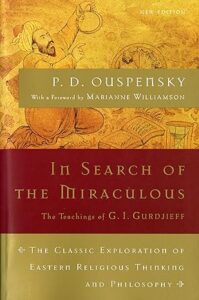
Since its original publication in 1949, In Search of the Miraculous has been hailed as the most valuable and reliable documentation of G. I. Gurdjieff’s thoughts and universal view. This historic and influential work is considered by many to be a primer of mystical thought as expressed through the Work, a combination of Eastern philosophies that had for centuries been passed on orally from teacher to student. Gurdjieff’s goal, to introduce the Work to the West, attracted many students, among them Ouspensky, an established mathematician, journalist, and, with the publication of In Search of the Miraculous, an eloquent and persuasive proselyte.
“All people think that they can do, all people want to do, and the first question all people ask is what they are to do. But actually nobody does anything and nobody can do anything. This is the first thing that must be understood. Everything happens. All that befalls a man, all that is done by him, all that comes from him – all this happens. And it happens in exactly the same way as rain falls as a result of a change in the temperature in the higher regions of the atmosphere or the surrounding clouds, as snow melts under the rays of the sun, as dust rises with the wind.”
“Man has no permanent and unchangeable I. Every thought, every mood, every desire, every sensation, says ‘I’. And in each case it seems to be taken for granted that this I belongs to the Whole, to the whole man, and that a thought, a desire, or an inversion is expressed by this Whole. In actual fact there is no foundation whatever for this assumption. Man’s every thought and desire appears quite separately and independently of the Whole. And the Whole never expresses itself, for the simple reason that it exists, as such, only physically as a thing, and in the abstract as a concept. Man has no individual I. But there are, instead, hundreds and thousands of separate small I’s, very often entirely unknown to one another, never coming into contact, or, on the contrary, hostile to each other, mutually exclusive and incompatible. Each minute, each moment, man is saying or thinking ‘I’. And each time his I is different. Just now it was a thought, now it is a desire, now a sensation, now another thought, and so on, endlessly. Man is a plurality. Man’s name is legion.”
“One may say that evil does not exist for subjective man at all, that there exist only different conceptions of good. Nobody ever does anything deliberately in the interests of evil, for the sake of evil. Everybody acts in the interests of good, as he understands it. But everybody understands it in a different way. Consequently men drown, slay, and kill one another in the interests of good. The reason is again just the same, men’s ignorance and the deep sleep in which they live.”


